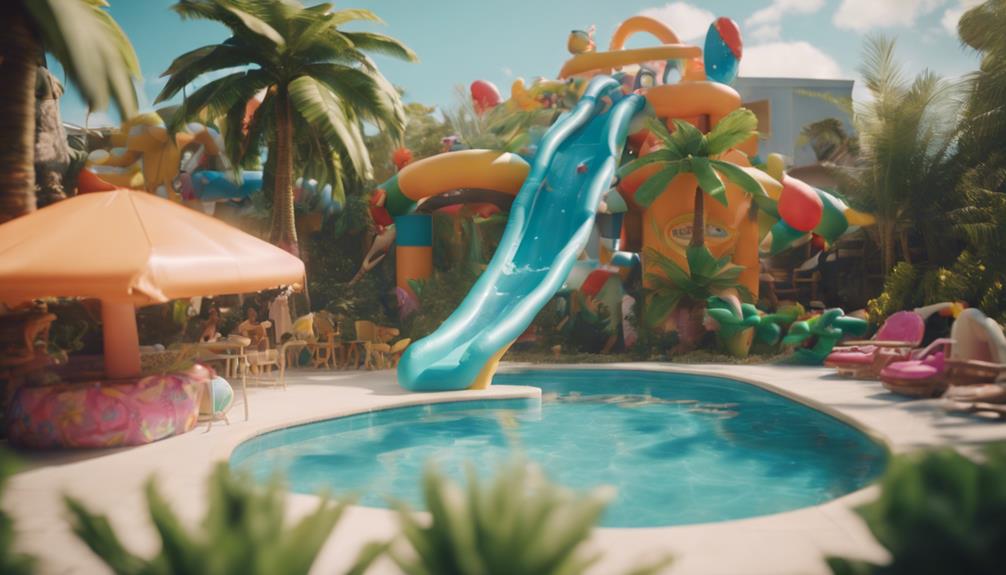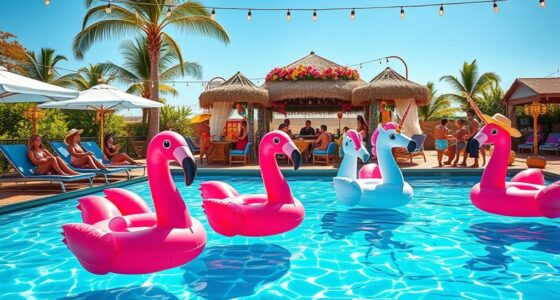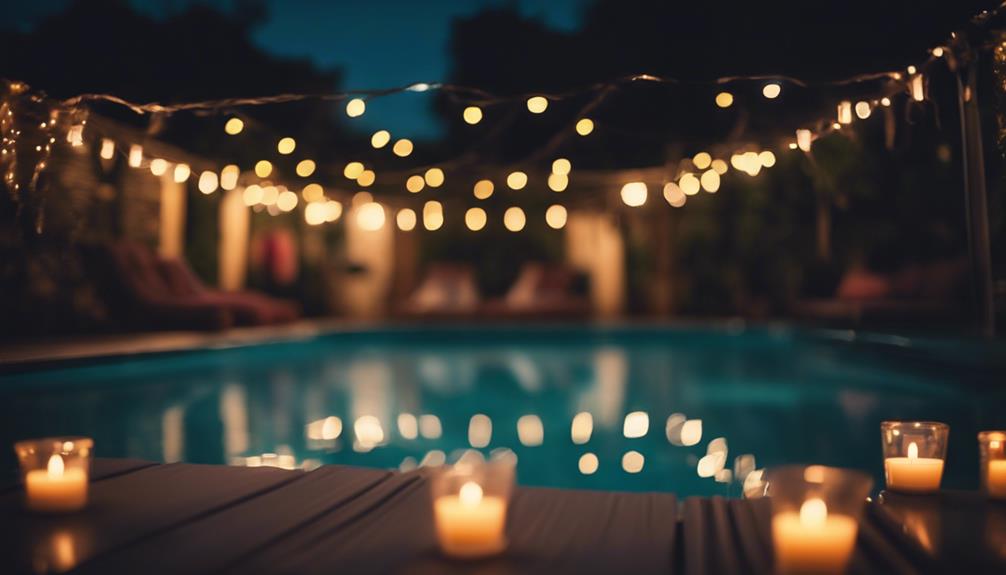When using aromatherapy near a pool, choose gentle oils like lavender, chamomile, or citrus and dilute them properly with a carrier oil. Keep diffusers away from water, children, and pets, and avoid overuse to prevent strong scents that could cause headaches or irritation. make certain good ventilation and monitor scent levels to maintain a relaxing environment. Staying cautious helps protect your health and water quality—continue to explore how to do this safely.
Key Takeaways
- Use gentle, diluted essential oils like lavender or citrus outdoors, avoiding strong or overwhelming scents near the pool.
- Keep diffusers away from water, children, and pets to prevent accidental ingestion or skin contact with concentrated oils.
- Limit the number of drops and diffusion duration to maintain safe scent levels and prevent respiratory discomfort.
- Inform guests of any essential oils used to accommodate allergies or sensitivities and provide options to step away if needed.
- Consult a healthcare professional or aromatherapist for guidance on safe essential oil use in outdoor pool environments.

Imagine enhancing your poolside experience with the soothing scents of aromatherapy, creating a calming oasis right by the water. It’s a tempting idea—basking in the sun while inhaling calming essential oils that help you unwind. But before you start diffusing oils near the pool, it’s vital to understand essential oil safety. Not all oils are suitable for outdoor use, especially around water and other people. Some essential oils can cause skin irritation, allergic reactions, or respiratory issues if misused. Knowing which oils are safe and how to use them responsibly ensures your poolside relaxation remains enjoyable rather than risky.
When it comes to essential oil safety, always remember that not every oil is meant for direct skin contact or dispersal around children, pets, or sensitive individuals. If you’re planning to diffuse oils outdoors, opt for gentle, well-tolerated varieties like lavender, chamomile, or citrus oils, but still use them in moderation. Over-concentrated diffusions can lead to headaches, nausea, or respiratory discomfort, especially in an open environment where the scent can quickly fill the space. To maintain safety, never apply essential oils directly on your skin near the pool unless they’re properly diluted with a carrier oil. This helps prevent skin irritation and keeps your poolside relaxation safe and soothing.
In addition to considering the oils themselves, pay attention to the method of diffusion. Using a small, portable diffuser designed for outdoor use can disperse the scent evenly without overwhelming the senses. Keep the diffuser away from children and pets, and avoid placing it directly in the water or on surfaces that could get wet or damaged. Remember, essential oils are potent substances—less is more when it comes to outdoor aromatherapy. Use just a few drops and monitor the scent’s intensity to avoid overpowering the peaceful atmosphere you’re aiming for. Additionally, consider the importance of proper air quality maintenance to prevent any adverse effects from concentrated scents or allergens lingering in the environment.
It’s also wise to be aware of any allergies or sensitivities among your guests before diffusing essential oils. Always inform everyone about the oils you plan to use and give them an option to step away if they experience discomfort. If you’re unsure about safety, consult with a certified aromatherapist or healthcare provider beforehand. When used responsibly, essential oils can enhance your poolside relaxation, turning your outdoor space into a tranquil retreat. Just keep safety top of mind, choose your oils carefully, and enjoy the calming scents that elevate your poolside bliss—safely and naturally.
Frequently Asked Questions
Can Essential Oils Harm Pool Filters or Equipment?
Essential oils can harm your pool filters or equipment if they’re not compatible with pool filtration systems. Many oils, especially thick or oily ones, can clog filters or cause buildup. Always check essential oil compatibility before adding them near pools, and avoid pouring oils directly into the water. Using diffuser methods away from the pool area is safer, ensuring your pool filtration stays clean and functional.
Are There Specific Scents Safe for Children Near Pools?
Think of calming lavender as the gentle whisper of a lullaby, making it a great choice for children near pools. Child-safe scents like chamomile and citrus are family-friendly aromatherapy options that won’t upset sensitive noses or pool chemistry. Always dilute essential oils properly, keep sprays away from eyes, and make sure good ventilation. With these precautions, you can create a soothing environment that’s safe and enjoyable for your little ones.
How Long Should I Wait After Diffusing Oils Before Swimming?
You should wait at least 30 minutes after diffusing oils before swimming. This waiting period allows the scents to disperse and reduces inhalation risks. Keep your diffusing duration moderate—about 15-20 minutes at a time—and make sure good ventilation. If you notice any irritation or strong scent, extend the waiting period accordingly. Always prioritize safety by giving the oils enough time to clear before you hit the pool.
Do Certain Oils Increase the Risk of Slip Hazards Around Pools?
Imagine walking on a freshly waxed floor—you might slip even if it looks clean. Certain oils, like citrus or eucalyptus, can leave oily residues that increase slip risk around pools. These residues make surfaces slick, especially when combined with water. To stay safe, avoid diffusing oils near pools or wipe down surfaces thoroughly after diffusing, preventing slip hazards and ensuring everyone stays safe around the water.
Can Aromatherapy Affect Pool Water Chemistry or Ph Levels?
Aromatherapy can affect pool water chemistry through essential oil evaporation, which may lead to pool water contamination. When oils evaporate, they introduce chemicals that alter pH levels and potentially clog filtration systems. To keep your pool safe, avoid adding essential oils directly to the water, and guarantee proper ventilation to minimize evaporation. Regular testing of your pool’s pH and chemistry can help you detect and manage any changes caused by aromatherapy.
Conclusion
Did you know that over 50% of pool owners use aromatherapy to enhance relaxation? Just remember, not all essential oils are safe around pools—some can cause slipping hazards or skin irritation. Always choose oils labeled as safe for outdoor or aquatic use, and keep them well away from the water’s surface. By being cautious, you can enjoy the soothing benefits of aromatherapy without risking safety or pool maintenance.










